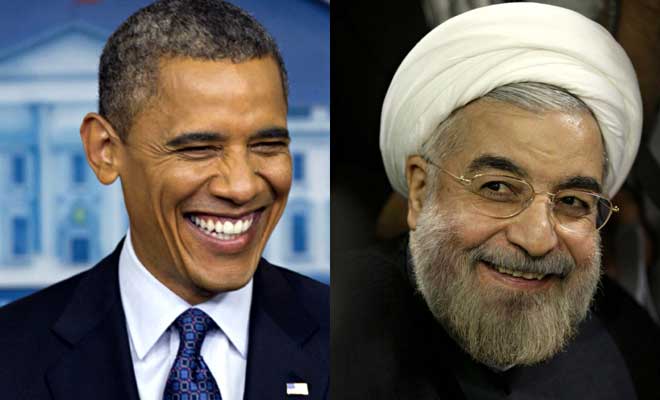The headlines this week are of Iran’s engagement with the US. Discussions in Geneva between Tehran and the 5+1 Powers over Tehran’s nuclear program have been “very useful” and “very positive” so far.
So it is a rude awakening to see this announcement from the US Government-funded National Endowment for Democracy:
While many commentators have presented Iran’s President Hassan Rouhani as a representative of the regime’s “moderate” wing and the harbinger of a new political opening, the evidence suggests otherwise, according to leading analysts.
The NED, created in 1983 during the Reagan Administration’s battle against the “evil empire” of the Soviet Union, is nominally private; however, it is funded by the US Government and its public positions usually promote the official line of American foreign policy.
The post is by Michael Allen, NED’s Special Assistant for Government Relations and External Affairs and editor of its blog “Democracy Digest”.
Instead of referring to this week’s developments, Allen’s press release, “Iran — ‘Post-Ideological’, ‘Failed Totalitarian State'”, invokes a polemic from Ray Takeyh in The Washington Post that says Tehran must concede to American demands.
Takeyh, a Senior Fellow at the Council on Foreign Relations, declares that “a cohort of hard-liners” including “a shadowy Revolutionary Guards officer” are directing Iran’s foreign policy at the Supreme National Security Council.
Takeyh produces no evidence for the assertion, and he seems to have missed the news that President Rouhani, preparing for discussions with the West, took the nuclear file away from the SNSC and gave it to the Foreign Ministry.
This may be because facts stand in the way of his insistence on Iran’s capitulation:
Given the stark realities, it is time for the great powers to have a maximalist approach to diplomacy with Iran. It is too late for more Iranian half-steps and half-measures. Tehran must account for all its illicit nuclear activities and be compelled to make irreversible concessions that permanently degrade its ability to reconstitute its nuclear weapons program at a more convenient time.
Allen cites — and apparently endorses — political philosopher Ramin Jahanbegloo on “a new generation of activists and intellectuals [rejecting] the revolutionary ideologies of Marxism and Islamism to embrace pragmatic politics informed by liberalism”.
However, the NED official’s priority is his denunciation of the “moderate” Rouhani as the figurehead for a menacing Islamic Republic:
Iran is also a “failed totalitarian state,” said Mehdi Khalaji, a senior fellow at The Washington Institute for Near East Policy, a Shia theologian by training, who is currently writing a biography of Supreme Leader Ayatollah Ali Khamenei.
To drive the point home, Allen returns to another diatribe in The Washington Post, this one from former CIA operative Reuel Marc Gerecht and Mark Dubowitz of the Foundation for the Defense of Democracies: ““The United States shouldn’t be fooled by false divisions within the regime.”
So a question: do the American officials talking this week to Iranian counterparts in Geneva — or US Secretary of State John Kerry meeting Iranian Foreign Minister Mohammad Javad Zarif at the United Nations last month or Barack Obama in his historic phone call with President Rouhani — believe they are dealing with puppets for hard-liners and/or failed totalitarians?
Or is NED banging a propaganda drum that no longer fits the approach of the Obama Administration?

